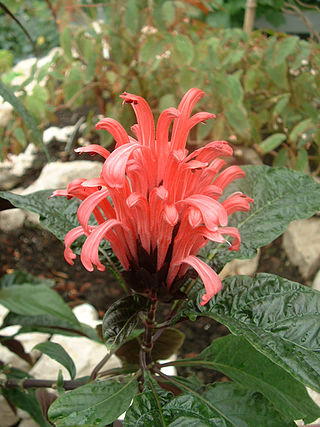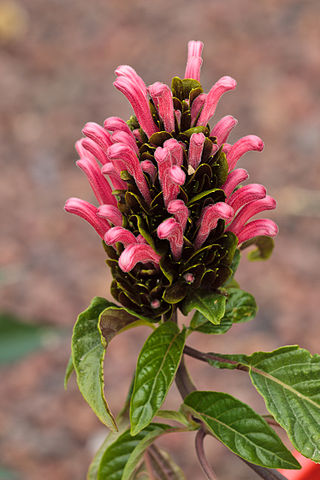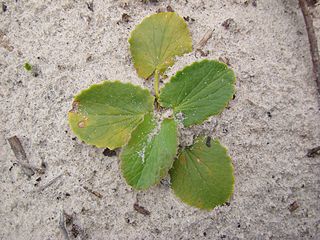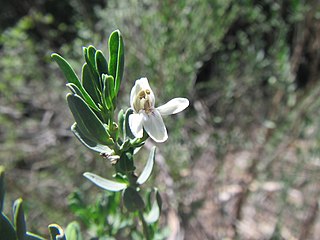
Justicia brandegeeana, the Mexican shrimp plant, shrimp plant or false hop, is an evergreen shrub in the genus Justicia of the acanthus family Acanthaceae, native to Mexico, and also naturalized in Florida.

Acanthaceae is a family of dicotyledonous flowering plants containing almost 250 genera and about 2500 species. Most are tropical herbs, shrubs, or twining vines; some are epiphytes. Only a few species are distributed in temperate regions. The four main centres of distribution are Indonesia and Malaysia, Africa, Brazil, and Central America. Representatives of the family can be found in nearly every habitat, including dense or open forests, scrublands, wet fields and valleys, sea coast and marine areas, swamps, and mangrove forests.

Justicia is a genus of flowering plants in the family Acanthaceae. It is the largest genus within the family, with over 900 accepted species. They are native to tropical to warm temperate regions of the Americas, India, and Africa. The genus serves as host to many butterfly species, such as Anartia fatima. Common names include water-willow and shrimp plant, the latter from the inflorescences, which resemble a shrimp in some species. The generic name honours Scottish horticulturist James Justice (1698–1763). They are closely related to Pachystachys.

Club Social y Deportivo Defensa y Justicia, commonly known as Defensa y Justicia, is an Argentine football club from Florencio Varela, Buenos Aires, established in 1935. The senior squad currently plays in the Primera División, the top division of the Argentine football league system.

Justicia aurea is a species of flowering plant in the family Acanthaceae. It is a shrub native to Mexico and Central America, ranging from northeastern Mexico to Panama.

Justicia floribunda is a species of flowering plant in the acanthus family Acanthaceae, native to southern Brazil, Paraguay, and Misiones Province of northeastern Argentina.

Justicia adhatoda commonly known in English as Malabar nut, adulsa, adhatoda, vasa, vasaka, is native to Asia. Adathoda means 'untouched by goats' in Tamil. The name derives from the fact that animals like goats do not eat this plant due to its extreme bitter taste.

Dianthera americana, the American water-willow, is a herbaceous, aquatic flowering plant in the family Acanthaceae native to North America. It is the hardiest species in the genus Dianthera, the other members of which being largely tropical and subtropical, and it is able to survive as far north as USDA zone 4. It is common throughout its range.

Justicia californica is a deciduous species of flowering shrub native to the deserts of southern California, southern Arizona, and northern Mexico. Its common names include chuparosa, hummingbird bush, and beloperone.

Justicia spicigera is an evergreen shrub with tubular orange flowers. The species is native to the Bahamas, Belize, Colombia, Costa Rica, El Salvador, Guatemala, Hispaniola, Honduras, and Mexico.
Justicia flaviflora is a species of herbaceous plant in the family Acanthaceae. It was previously classified as Beloperone flaviflora. The species is endemic to the island of Trinidad in the Caribbean republic of Trinidad and Tobago where it is only known from near the peaks of mountains in the Northern Range. It is an erect herb with leaves up to 27 cm (11 in) long. It is suffering from habitat degradation and has become increasingly rare, being now rated as "critically endangered".
Justicia tobagensis is a species of plant in the family Acanthaceae which is endemic to Trinidad and Tobago. The species is only known from two areas in the Main Ridge of Tobago. It was first described as Drejerella tobagensis by German botanist Ignatz Urban in his Symbolae Antillanae, based on a collection made by Danish botanist Henrik von Eggers.

Justicia gendarussa, commonly known as willow-leaved justicia ,Lapsulis in Creole Seychelles; is a small erect, branched shrub. According to Plants of the World Online it is native to the Indian subcontinent, Indochina, Peninsular Malaysia, Sumatra, the Philippines, and New Guinea, and has been introduced to Nepal, the western Himalayas, Pakistan, southern China including Hainan and Taiwan, eastern Africa, and the Mascarene Islands, Comoro Islands, and Seychelles. It has been described as rare and endemic to India, though those claims are at least confusing, in the context of statements that the plant is widely used in various forms for many of its medicinal and insecticidal properties, and that it is a quick-growing, evergreen forest shrub considered to be a native of China and distributed in Sri Lanka, India and Malaysia.

Ugolino Martelli (1860–1934) was an Italian botanist, biologist, and mycologist. Martelli is known for his studies of and contributions to the systematics of the tropical genus Pandanus and his taxonomic definition of the flora of Sardinia. He also specialized in studies of the flora of Tuscany and Malaysia.

Justicia carnea, the Brazilian plume flower, Brazilian-plume, flamingo flower, or jacobinia, is a flowering plant in the family Acanthaceae.

The Shatavar Vatika Herbal Park, Hisar, named after the shatavar herb, is a 125-acre herbal park for the conservation of several endangered ayurvedic medicinal herbs. It is located on Hisar-Dhansu road, which runs off 'Hisar-Barwala NH-52', in Hisar city of Haryana state in India.

Ch. Surender Singh Memorial Herbal Park, Tosham is a herbal and medicinal plants park in Tosham town of Bhiwani district in the Indian state of Haryana.

Justicia cuneata is a species of subshrub in the genus Justicia. It is native to Namibia and the Cape Provinces of South Africa.















